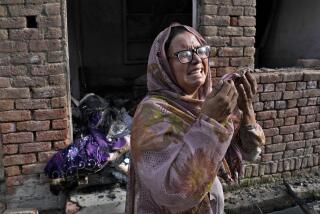Bombing at Mosque Leaves 12 Shiites Dead
- Share via
BAGHDAD — At least a dozen Shiite worshipers in the capital and the leading Sunni Arab cleric of southern Iraq were killed Friday in a new round of sectarian violence, tarnishing the Muslim holy day.
The attacks came days after Iraqi officials unveiled a much-touted security plan that includes a ban on vehicles in the capital on Fridays to curb the targeting of religious sites.
Sheik Yousuf Hassan of Basra, the most prominent Sunni religious leader in the country’s south, was assassinated as he drove to the troubled port city’s main Sunni mosque, sparking anger and fear among the region’s minority sect.
“A person who had good protection got killed,” said Esam Ghanim, a Sunni Arab who lives near Basra. “I wonder what the chances are for people like me.”
Forty-five minutes before Hassan was to lead Friday prayers at the Great Mosque, three gunmen on foot approached Hassan’s car in central Basra, fired four bullets into his chest and wounded his two bodyguards, a colleague said.
“We lost one of our religious symbols,” said Dawoud abu Omar, a Sunni resident of Zubayr, south of Basra. “His targeting means targeting the whole Sunni sect in the region.”
Southern Iraq has fallen under the sway of Shiite militiamen and political parties with ties to Iran, and Sunnis fear that they are being targeted with the Shiite-dominated government’s apathy, if not approval.
“We don’t want to accuse anybody, but we really want to ask the government, ‘Where is your new security plan?’ ” said Sheik Abdul Baset Subaii, a Basra spokesman for the Muslim Scholars Assn., a Sunni Arab religious group.
President Jalal Talabani, an ethnic Kurd who maintains friendly ties with both the United States and Iran, acknowledged in a TV interview Friday evening that some Shiite militias continued to receive support from Tehran. But he said Iraq was no stranger to foreign influence.
“There was a time when Iran funded us,” said Talabani, who led a Kurdish rebellion against Saddam Hussein. “But as the president of the Republic of Iraq, I reject that and ask that Iran not interfere in the affairs of Iraq,” he said on Al Arabiya satellite channel.
In Friday’s most deadly attack, a suicide bomber smuggled explosives in a shoe into Baghdad’s Bratha Mosque, a major Shiite house of worship, killing at least 12 people and injuring at least 17, Iraqi officials said.
The blast, an apparent attempt to kill outspoken Shiite legislator and prayer leader Sheik Jalaluddin Saghir, charred the mosque’s main hallway and splattered blood on the turquoise-tiled walls and a nearby staircase leading to the cleric’s office.
Panicked worshipers chanted “God is great!” as they rushed for the exit before police and soldiers arrived to restore order.
“I saw body parts, specks of blood, torn pieces of clothing scattered everywhere,” said Salam Fadhil. The explosion went off before Saghir entered the building.
Mosque officials gathered the head and other remains of the suicide bomber onto a plastic garbage can lid. The mosque’s security chief, who asked that his name not be published, said the assailant might have panicked and set the bomb off early after security officers began to inspect worshipers who had entered the mosque.
Security at the mosque was tightened after triple suicide bombings there in April killed at least 78 people and injured 150. Attacks on mosques and shrines, which U.S. and Iraqi officials say brought the country to the precipice of civil war several weeks ago, had subsided.
In northwest Baghdad, a barrage of mortar rounds landed on houses in a religiously mixed northwestern neighborhood, killing three and injuring seven, police said. One person died and two were wounded in roadside bombings in south Baghdad.
In northern Iraq, a soldier and oil company worker were fatally shot in separate incidents today in Hawija, a Sunni Arab district southwest of Kirkuk, police said.
Times staff writer Raheem Salman in Baghdad and special correspondents in Basra and Kirkuk contributed to this report.
More to Read
Sign up for Essential California
The most important California stories and recommendations in your inbox every morning.
You may occasionally receive promotional content from the Los Angeles Times.













